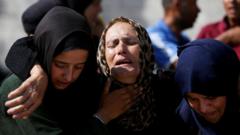Iran's decision to cease collaboration with the International Atomic Energy Agency (IAEA) has ignited concerns about its nuclear program's transparency following severe conflicts with Israel and the U.S.
Iran Halts Cooperation with Nuclear Inspectors Amid Ongoing Conflict

Iran Halts Cooperation with Nuclear Inspectors Amid Ongoing Conflict
International inspectors exit Iran, raising alarms over nuclear ambitions as U.S.-led strikes increase regional tensions.
As of July 4, 2025, the United Nations' nuclear watchdog confirmed the departure of its inspectors from Iran, coming on the heels of President's enactment of a new law suspending cooperation with the agency. This critical move creates significant concern amongst experts regarding the potential for Iran to advance its nuclear ambitions, leading to speculation that it may seek to deepen its program underground.
Tensions flared between Iran and the IAEA after a series of military strikes by Israel targeted Iranian military and nuclear infrastructure, which included the deaths of nuclear scientists. The IAEA reported that Iran had not been compliant with its nonproliferation obligations, which Iran contends has served as a pretext for the attacks.
While the extent of damage to Iran's nuclear capabilities remains uncertain, U.S. officials claim that bombing raids led to substantial setbacks to the program, though nuclear watchdog Rafael Grossi warns that the stockpile of highly enriched uranium could still allow Iran to develop nuclear weapons at any moment.
Iranian lawmakers have demanded guarantees for the safety of their nuclear program and scientists as prerequisites for resuming IAEA cooperation, insisting on their right to enhance uranium under international law. In light of the situation, Iranian officials have expressed a readiness to engage in diplomatic discussions with the United States, signaling a potential path forward amidst the growing adversity and conflict that frames the region's geopolitical landscape.
Tensions flared between Iran and the IAEA after a series of military strikes by Israel targeted Iranian military and nuclear infrastructure, which included the deaths of nuclear scientists. The IAEA reported that Iran had not been compliant with its nonproliferation obligations, which Iran contends has served as a pretext for the attacks.
While the extent of damage to Iran's nuclear capabilities remains uncertain, U.S. officials claim that bombing raids led to substantial setbacks to the program, though nuclear watchdog Rafael Grossi warns that the stockpile of highly enriched uranium could still allow Iran to develop nuclear weapons at any moment.
Iranian lawmakers have demanded guarantees for the safety of their nuclear program and scientists as prerequisites for resuming IAEA cooperation, insisting on their right to enhance uranium under international law. In light of the situation, Iranian officials have expressed a readiness to engage in diplomatic discussions with the United States, signaling a potential path forward amidst the growing adversity and conflict that frames the region's geopolitical landscape.






















